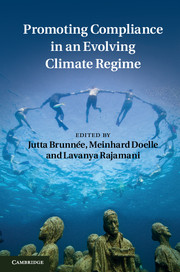Book contents
- Frontmatter
- Contents
- Contributors
- Preface
- Abbreviations
- Introduction: The role of compliance in an evolving climate regime
- Part I Context
- Part II The Kyoto compliance system: Features and experience
- Part III Compliance and the climate regime: Issues, options, and challenges
- 7 The role of non-state actors in climate compliance
- 8 Facilitation of compliance
- 9 Enforcing compliance in an evolving climate regime
- 10 Financial mechanisms under the climate regime
- 11 Post-2012 compliance and carbon markets
- 12 Compliance and the use of trade measures
- 13 ‘Comparability of efforts’ among developed country parties and the post-2012 compliance system
- 14 From the Kyoto compliance system to MRV
- 15 Compliance in transition countries
- 16 Developing countries and compliance in the climate regime
- 17 The role of dispute settlement in the climate regime
- 18 Depoliticizing compliance
- Part IV A look forward
- Bibliography
- Index
- References
15 - Compliance in transition countries
Published online by Cambridge University Press: 05 January 2012
- Frontmatter
- Contents
- Contributors
- Preface
- Abbreviations
- Introduction: The role of compliance in an evolving climate regime
- Part I Context
- Part II The Kyoto compliance system: Features and experience
- Part III Compliance and the climate regime: Issues, options, and challenges
- 7 The role of non-state actors in climate compliance
- 8 Facilitation of compliance
- 9 Enforcing compliance in an evolving climate regime
- 10 Financial mechanisms under the climate regime
- 11 Post-2012 compliance and carbon markets
- 12 Compliance and the use of trade measures
- 13 ‘Comparability of efforts’ among developed country parties and the post-2012 compliance system
- 14 From the Kyoto compliance system to MRV
- 15 Compliance in transition countries
- 16 Developing countries and compliance in the climate regime
- 17 The role of dispute settlement in the climate regime
- 18 Depoliticizing compliance
- Part IV A look forward
- Bibliography
- Index
- References
Summary
Introduction
Compliance with the obligations under the Kyoto Protocol is key to the protocol’s environmental integrity; it supports the carbon market’s credibility and ensures transparency of accounting by parties. Annex I parties, including countries that are undergoing the process of transition to a market economy (EITs), are required to comply with their quantified emission limitation and reduction targets, the methodological and reporting requirements for greenhouse gas inventories, and the eligibility requirements under the flexibility mechanisms.
Emission trends of EITs indicate that rather than struggling with meeting their emission targets, they face the challenge of utilizing their ‘carbon surpluses’ for the sustainable development of their economies. The issue of over-compliance is closely linked to the question of how to leverage surplus emission allowances through Joint Implementation and Green Investment Schemes in a way that ensures the environmental integrity of the Kyoto Protocol and supports the sustainable development of EITs. While emissions targets currently do not seem to raise compliance issues for EITs, compliance with methodological and reporting requirements on the other hand has raised some criticism and led to the involvement of the Kyoto Protocol Compliance Committee.
- Type
- Chapter
- Information
- Promoting Compliance in an Evolving Climate Regime , pp. 339 - 366Publisher: Cambridge University PressPrint publication year: 2011



